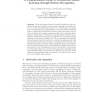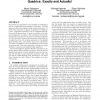1707 search results - page 56 / 342 » A Computational Model for Arguments Understanding |
ITS
2010
Springer
15 years 2 months ago
2010
Springer
Accelerated future learning, in which learning proceeds more effectively and more rapidly because of prior learning, is considered to be one of the most interesting measures of ro...
HICSS
1999
IEEE
15 years 2 months ago
1999
IEEE
This paper presents a case study on the use of an alternative method of computer support to that normally used, one that uses voting as a tool for social rather than rational choi...
COMPGEOM
2001
ACM
15 years 1 months ago
2001
ACM
We present two approaches to the problem of calculating a cell in a 3-dimensional arrangement of quadrics. The first approach solves the problem using rational arithmetic. It work...
JASIS
2010
14 years 4 months ago
2010
People taking part in argumentativedebates through collective annotationsface a highly cognitive task when trying to estimate the group's global opinion. In order to reduce t...
ACSC
2003
IEEE
15 years 3 months ago
2003
IEEE
In response to Searle's well-known Chinese room argument against Strong AI (and more generally, computationalism), Harnad proposed that if the symbols manipulated by a robot ...


